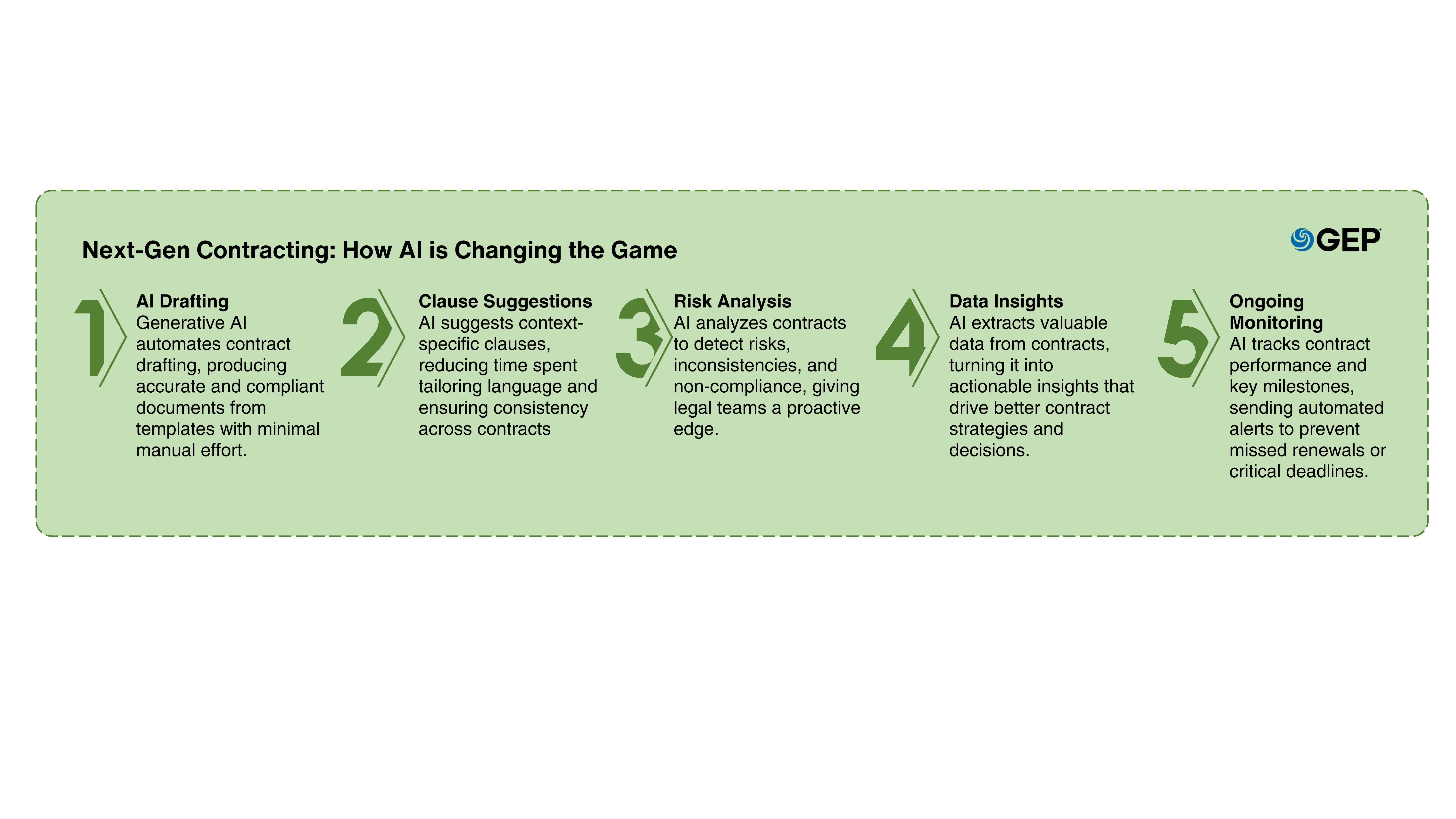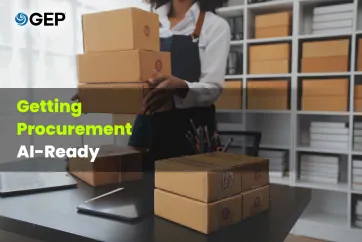
How AI Transforms the Contract Management Process
- Effective contract management enhances operational efficiency and reduces compliance risks.
- A structured contract management process improves financial performance and strengthens business relationships.
- Generative AI in contract management transforms the process and boosts strategic decision-making through better data visibility and risk management.
November 16, 2024 | Procurement Strategy 6 minutes read
Procurement teams have to spend a lot of time and effort getting contracts right. Effective contract management enables businesses to remain compliant, mitigating risks and maximizing operational efficiency. Contracts are the backbone of business relationships, outlining the terms and conditions that govern interactions between parties.
What is Contract Management?
Contract management is a structured approach to handling contracts throughout their entire lifecycle. It includes everything from planning and drafting to negotiating, approving, executing, monitoring, and eventually renewing or terminating contracts. The goal is to ensure that all parties meet their obligations while also achieving the business's objectives.
Effective contract management is not merely about leveraging the right technologies, but it's also about implementing efficient processes and conducting a thorough risk assessment.
Advantages of an Effective Contract Management Process
Standardizing and automating routine tasks can free up expert resources so that they can focus on exceptions and complex cases. Furthermore, a robust contract management process ensures that all contracts comply with relevant laws and regulations, reducing legal exposure.
Proactive risk assessment enables organizations to identify and manage potential risks associated with contractual agreements, while maintaining comprehensive records and audit trails simplifies compliance audits and assessments.
Financial optimization is another key benefit of effective contract management. Visibility into contractual commitments and expenditures leads to better budget management and timely invoicing and payment collection, improving cash flow and revenue recognition.
By promoting transparency and clear communication in supplier relationships, a strong contract management practice ensures that all parties understand their obligations, which in turn facilitates performance monitoring and enables timely feedback and improvements.
A well-executed contract management process supports strategic decision-making by generating valuable data and analytics on contract performance and trends.
Steps Involved in the Contract Management Process
The contract management process usually begins by identifying the need for a contract. The initial phase determines the scope, objectives and key terms of the contract and engaging relevant stakeholders — legal, procurement, finance, operations, etc. — to gather input and align expectations.
Once the contract requirements have been defined, the procurement team starts the authoring and drafting phase, ensuring that the contract document accurately contains the agreed-upon terms and conditions.
The next phase involves discussing and adjusting terms to reach a mutually acceptable agreement, conducting thorough internal reviews by legal and compliance teams, and allowing counterparties to review and suggest modifications to the contract terms.
The contract then moves toward formal approval and signing. This stage involves following predefined approval workflows to obtain necessary endorsements from authorized personnel. The executed contract is stored in a centralized repository for easy access and future reference.
The contract management process also includes continual performance and compliance management. This requires monitoring and managing the fulfillment of contractual obligations by all parties, regular assessment of progress and performance against contractual terms, and adherence to regulatory requirements and internal policies.
Generative Artificial Intelligence (AI Transforming Contract Management Process
Generative AI can transform the contract management process, starting from the drafting phase to enhancing contract accuracy to providing actionable insights. Let’s take a quick look at some of ways generative AI can significantly boost the contract management process, making it more efficient, secure, and strategically valuable:
AI-Assisted Contract Drafting
Based on GEP’s interactions with various high-tech companies, the absence of dedicated buy-side contracting teams leads to sourcing and category managers spending 30% to 50% of their time working on contracts.
But with generative AI, human intervention is minimum. GenAI can produce contract drafts from existing templates and use the specified legal language, ensuring consistency, accuracy and adherence to compliance standards.
Intelligent Clause Suggestions
AI can also recommend relevant clauses based on the context and specific needs of a contract. This helps enterprises cut time and effort needed to tailor the text for different situations.
Contract Analysis and Risk Identification
AI can analyze contracts for potential risks, inconsistencies, or non-compliant clauses. This can provide the legal teams instant access to issues so that they tackle those before they snowball into issues.
Data Extraction and Reporting
Organizations can leverage AI to extract valuable data from contracts for insights and reports for informed decision-making and improving contract management strategies.
Constant Monitoring and Alerts
Artificial intelligence can monitor contract performance, track key milestones, and automatically send alerts for critical dates (such as renewals or deadlines), enabling companies to cut the risk of missed commitments.
To sum up — implementing contract management best practices should be an ongoing process. Establish mechanisms to capture and analyze contract data, identify trends, and learn from past experiences.
AI-Powered Contract Negotiation
AI is transforming contract negotiation by equipping procurement teams with powerful data-driven insights. Advanced AI systems can analyze thousands of historical contracts to identify optimal terms, pricing benchmarks, and potential risks without human bias.
During negotiations, AI provides real-time guidance on concessions and fallback positions based on organizational priorities and market conditions. It flags unusual clauses or deviations from standard terms that might otherwise go unnoticed.
AI negotiation assistants can simulate different scenarios to predict outcomes and recommend the most advantageous approach for specific suppliers or contract types. This enables procurement professionals to prepare more thoroughly and negotiate from positions of strength. The most effective approach combines AI's analytical capabilities with procurement professionals' relationship management skills and contextual understanding.
How to Overcome Challenges in AI Contract Management
Enterprises face several challenges when implementing AI for contract management. To overcome these obstacles, enterprises should start with clean data migration, ensuring all contracts are digitized and properly tagged. Clear governance frameworks help define AI usage boundaries and maintain human oversight for critical decisions.
Training is essential. And this applies to AI systems as well as the teams using them. AI requires constant refinement with contract-specific data to improve accuracy, while staff need practical education on working with AI tools effectively.
Integration challenges can be addressed by selecting AI solutions compatible with existing procurement and legal systems. Companies should establish realistic performance metrics to track AI effectiveness against business objectives.
Privacy concerns require implementing robust security measures and ensuring AI contract solutions comply with relevant regulations. Enterprises should also maintain transparency about how AI makes recommendations or decisions.
A phased implementation approach is recommended rather than extensive replacement of existing processes. Starting with specific use cases such as contract review or clause extraction builds confidence and demonstrates value before expanding to more complex applications. With thoughtful planning and systematic implementation, enterprises can successfully navigate the challenges of AI contract management to realize significant efficiency gains.
Future Trends in AI and Contract Management
The future of AI in contract management will transform how enterprises handle agreements across their lifecycle. Several key trends are emerging that procurement leaders should monitor.
Self-learning capabilities will advance significantly, with AI systems continuously improving from user interactions and feedback. This will reduce the initial training burden while enhancing accuracy over time. Natural language processing or NLP will become more sophisticated, enabling AI to understand complex legal concepts and nuances across multiple languages and jurisdictions.
Predictive analytics will move beyond identifying risks to actively suggesting optimal contract terms based on historical performance data and market conditions. This will help enterprises negotiate more favorable agreements aligned with business objectives.
Blockchain integration with AI contract management will create immutable audit trails and enable smart contracts that self-execute when predefined conditions are met. This combination will enhance transparency and reduce disputes between parties.
Automated negotiation assistants will emerge that can compare proposed terms against company standards, suggest alternatives, and even conduct preliminary negotiations with counterparty systems. Human experts will remain essential for complex agreements but will be more strategically deployed.
Regulatory compliance capabilities will expand as AI systems continuously monitor evolving laws across jurisdictions, automatically flagging contracts requiring updates or amendments.
Voice interfaces will become commonplace, enabling legal and procurement teams to query contract repositories and receive instant insights through conversational interactions rather than complex searches.
These advancements have the potential to fundamentally change contract management from a primarily administrative function to a strategic business driver delivering a measurable competitive advantage.
Also Read: 6 Real-World Use Cases of AI-Powered Contract Management Software
Conclusion
Effective contract management in the fast-paced and complex business landscape requires a comprehensive strategy, robust processes, and the right technology. A structured AI-driven contract management framework can help organizations navigate the unique challenges and unlock the full potential of their contractual agreements, driving value and fostering resilience.




